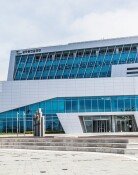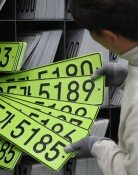[Opinion] Kim Sat-gats Roamings in North Korea
[Opinion] Kim Sat-gats Roamings in North Korea
Posted September. 07, 2005 06:34,
Though the land lies still, its waist is cut how did the northern land become dyed in blood?
Kim Sat-gats Roamings in North Korea, a radio soap opera that aired for 30 years on KBS 1 Radio every afternoon from 12:55p.m. for five minutes, was one of the most widely known anti-communist shows. The show, which used the tune from The tear-soaked Tumen River as its signature music, told the story of the Satgat (a bamboo hat) Mans travels, as he scolded the wrongdoings of North Korean leaders while expressing pity upon the miserable state of its people. The show succeeded to a point where South Korean students started imitating the North Korean comrade soldier, and in response, North Korea made a counterpart program in 1966 called Hong Gil-dongs Roamings in South Korea.
The show was organized by the Korean Central Intelligence Agency as part of the psychological warfare effort against the North. Due to a lack of intelligence on North Korea, the testimonies of arrested spies or those of people who came over to the South were said to have been used. The show continued to air, only this time during the night, after being moved in April 1994 to the KBS Social Education radio channel, before coming to a complete halt in April 2001, a year after the North-South Summit Talks. It was the result of the end of the Cold War and progress in North-South relations.
Lee Ki-myung, the executive advisor at the Peoples Solidarity for Participatory Democracy and writer of Kim Sat-gats Roamings in North Korea recently completed a four-day trip to Pyongyang and said he was deeply impressed by the North Koreans confident, bright faces and their flexible attitudes while adding that he felt sorry for depicting the North as a world where no man could live. He also confessed, The Korean Central Intelligence Agency supplied its own material, while I received twice the manuscript fee that 20-minute long scripts were getting for a five-minute script.
Nevertheless, Pyongyang is a special sector where only people from high-class society in North Korea live. In most cases, trained agents accompany South Koreans who venture there. The 18 pieces of writing posted by Byun Jong-hyuk (18) under the penname Sol on the homepage of the Seoul Youth Factory for Alternative Culture, vividly record the misery of refugees dying from starvation at North Korean medical relief stations. North Korea is not a livable world just yet. Determining the whole of North Korea based on a short impression of Pyongyang is nothing more than a hasty assumption, or a partial sentiment.
Lee Dong-kwan, Editorial Writer, dklee@donga.com
Headline News
- N. Korea launches cyberattacks on S. Korea's defense companies
- Major university hospital professors consider a day off each week
- Italy suffers from fiscal deficits from ‘Super Bonus’ scheme
- Inter Milan secures 20th Serie A title, surpassing AC Milan
- Ruling and opposition prioritize spending amid tax revenue shortfalls







